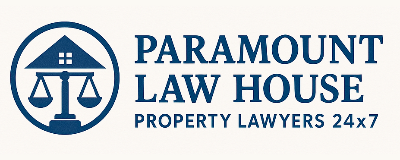Housing Development Law Experts: Navigate Legal Frameworks
Housing Development Law Experts: The real estate sector in India is dynamic. It is also complex. Many laws and regulations govern housing…
Housing Development Law Experts: The real estate sector in India is dynamic. It is also complex. Many laws and regulations govern housing development. Navigating these legal frameworks can be challenging. This is where expert legal guidance becomes essential. Paramount Law House: Property Lawyers 24×7 offers specialized expertise. We help you navigate the intricacies of housing development law.
Housing Development Law Experts: Navigate Legal Frameworks: Paramount Law House
Understanding the Regulatory Landscape
Several key pieces of legislation shape housing development in India. The Real Estate (Regulation and Development) Act, 2016 (RERA) is paramount. It aims to protect the interests of homebuyers. It also seeks to promote fair practices in the real estate sector.
RERA establishes the Real Estate Regulatory Authority (RERA) in each state. This authority oversees real estate projects. Developers must register their projects with RERA. They must also disclose crucial project details. These details include project plans and financial information. This ensures transparency and accountability. Furthermore, RERA mandates specific obligations for developers. They must adhere to the project timelines. They must also ensure the quality of construction. Any deviation can lead to penalties. Homebuyers have the right to seek redressal for grievances under RERA.
In addition to RERA, other laws play a significant role. These include land acquisition laws. They govern how land is acquired for development projects. Town and country planning laws dictate land use and zoning regulations. Building bye-laws specify construction standards and safety norms. Environmental laws also come into play. They regulate the environmental impact of development projects. Therefore, a comprehensive understanding of these legal frameworks is crucial. It ensures smooth and legally compliant housing development.
The Role of Legal Experts
Housing development involves numerous legal hurdles. These can range from land due diligence to obtaining necessary approvals. Expert legal counsel is invaluable in navigating these complexities. Firstly, legal experts conduct thorough due diligence. This involves scrutinizing land titles and ownership records. It helps identify any potential legal risks or encumbrances. This proactive step can prevent future disputes and delays. Secondly, lawyers assist in obtaining the necessary permits and approvals. This includes environmental clearances and building plan sanctions. They understand the procedures and requirements of various regulatory bodies. This ensures a streamlined approval process. Moreover, legal professionals draft and review crucial documents. These include sale agreements and construction contracts. They ensure that these documents protect the interests of all parties involved. They also ensure compliance with applicable laws.
Furthermore, disputes can arise during the course of a housing development project. These may involve issues related to title, possession, or construction quality. Legal experts provide effective dispute resolution strategies. They represent clients in negotiations, mediation, and litigation if necessary.Consequently, engaging experienced property lawyers is a prudent decision. It mitigates legal risks and ensures compliance at every stage of the development process.
Key Legal Aspects of Housing Development
Several key legal aspects demand careful attention in housing development. Land acquisition is the initial and critical step. It must comply with relevant land acquisition laws. Ensuring clear and marketable title is paramount. Following land acquisition, obtaining necessary approvals is crucial. This involves navigating a complex web of regulatory authorities. These authorities include town planning departments and environmental agencies. Compliance with zoning regulations and building bye-laws is mandatory. Next, drafting and negotiating various agreements is essential. This includes agreements with contractors, suppliers, and homebuyers. These agreements must be legally sound and protect the interests of all stakeholders.
Moreover, adherence to RERA provisions is non-negotiable. This includes project registration, disclosure requirements, and adherence to timelines. Non-compliance can attract significant penalties. Finally, managing potential disputes effectively is vital. This may involve negotiation, mediation, or litigation. Having experienced legal counsel can significantly impact the outcome of such disputes. Therefore, a meticulous approach to these legal aspects is essential for successful housing development.
Navigating RERA Compliance
The Real Estate (Regulation and Development) Act, 2016 (RERA) has brought significant changes to the housing development sector. Compliance with RERA is not just a legal obligation. It is also crucial for building trust and credibility. Firstly, project registration under RERA is mandatory for most residential and commercial projects. Developers need to provide detailed project information during registration. This includes project plans, layout, and financial details. Secondly, RERA mandates the disclosure of project progress to homebuyers. Developers must regularly update project status on the RERA portal. This ensures transparency and keeps buyers informed.Thirdly, RERA sets strict timelines for project completion. Developers are liable for delays and may have to pay compensation to homebuyers. This promotes timely delivery of projects. Furthermore, RERA establishes a mechanism for grievance redressal. Homebuyers can file complaints with the RERA authority for any violations. The authority has the power to adjudicate these disputes. Consequently, understanding and adhering to RERA provisions is crucial for developers. It ensures legal compliance and fosters positive relationships with homebuyers.
Due Diligence: The Foundation of Sound Development
Due diligence is a critical process in housing development. It involves a thorough investigation of the property and related legal aspects. This helps identify potential risks and liabilities. Firstly, title verification is a fundamental aspect of due diligence. Lawyers examine the chain of title documents to ensure clear and marketable ownership. This safeguards against future title disputes. Secondly, encumbrance searches are conducted. This involves checking for any existing mortgages, liens, or other charges on the property. This ensures that the property is free from such liabilities. Thirdly, land use and zoning regulations are carefully reviewed. This ensures that the proposed development is permissible under applicable laws. It prevents issues related to land use violations. Furthermore, environmental clearances and other statutory approvals are verified. This ensures that the project has obtained all necessary permissions. It avoids legal hurdles during construction. Consequently, comprehensive due diligence is essential. It minimizes legal risks and provides a solid foundation for successful housing development.
Dispute Resolution in Housing Development
Disputes are not uncommon in housing development projects. They can arise between developers and homebuyers. They can also occur between developers and contractors. Effective dispute resolution mechanisms are crucial. Firstly, negotiation is often the first step in resolving disputes. Parties attempt to reach a mutually acceptable solution through direct dialogue. This is usually the most cost-effective and time-efficient approach.Secondly, mediation involves a neutral third party. The mediator facilitates discussions between the disputing parties. They help them reach a voluntary settlement. Mediation is often confidential and less adversarial than litigation. Thirdly, arbitration is another alternative dispute resolution method. An arbitrator, or a panel of arbitrators, hears the arguments and makes a binding decision. Arbitration is generally faster than court proceedings.Finally, litigation may be necessary if other methods fail. This involves resolving the dispute in a court of law. It can be a lengthy and expensive process.Therefore, having legal expertise in dispute resolution is invaluable. It helps clients navigate these processes effectively and achieve favorable outcomes.
Paramount Law House: Your Partner in Housing Development Law
Paramount Law House: Property Lawyers 24×7 offers comprehensive legal services for housing development projects. Our team of experienced property lawyers possesses in-depth knowledge of the relevant legal frameworks. We assist developers with every stage of the development process. This includes land acquisition, due diligence, and obtaining necessary approvals. We also provide expert advice on RERA compliance. Furthermore, we draft and review all necessary legal documents. These include sale agreements and construction contracts. We ensure that these documents protect our clients’ interests. Moreover, we provide effective dispute resolution services. We represent clients in negotiations, mediation, arbitration, and litigation. Our goal is to achieve the best possible outcome for our clients. Consequently, partnering with Paramount Law House ensures that your housing development project proceeds smoothly and in compliance with all applicable laws. We are your trusted legal partners, available 24×7.
Frequently Asked Questions: Common Concerns in Housing Development Law
These experts primarily guide developers and other stakeholders through the complex web of regulations governing property development. This includes interpreting laws like RERA, advising on compliance, and mitigating legal risks.
The Real Estate (Regulation and Development) Act, 2016 (RERA) aims to bring transparency and accountability to the real estate sector. It protects homebuyers’ interests and establishes regulatory authorities for dispute resolution and project oversight.
Numerous legal hurdles can emerge, such as land title disputes, issues with obtaining necessary approvals (environmental, zoning), contractual disagreements with contractors or buyers, and non-compliance with RERA regulations leading to penalties.
Thorough due diligence by legal experts involves examining land titles, encumbrances, and regulatory compliance before project commencement. This proactive step helps identify and avoid potential legal problems and ensures a smoother development process.
It is advisable to engage a housing development law expert right from the initial stages of a project, starting with land acquisition and due diligence. Early legal involvement can prevent future complications and ensure compliance at every step, from planning to handover.
Conclusion
Navigating the legal frameworks governing housing development in India requires expertise and experience. Paramount Law House: Property Lawyers 24×7 is committed to providing comprehensive legal support. We guide our clients through the complexities of RERA and other relevant laws. Our proactive approach and expert legal counsel help mitigate risks and ensure successful project completion. Contact us today for reliable and effective legal solutions for your housing development needs.
Read More
- Illegal Possession of Immovable Property: Legal Remedies Available
- Indian Easements: Legal Guidance for Property Owners
- Industrial Land Law Experts: Ensure Compliance and Protection
- Injunction Order Assistance: Protect Your Property Rights
- Joint Ownership of Property: Legal Assistance Available
- Ministry of Housing and Urban Affairs (MoHUA):






